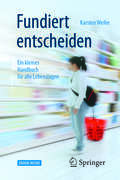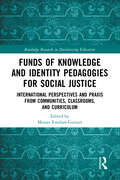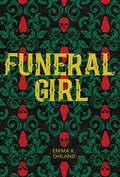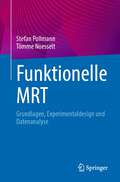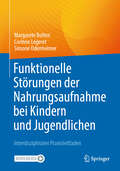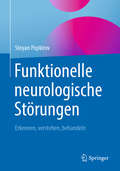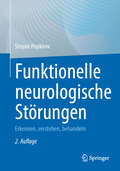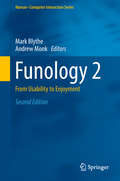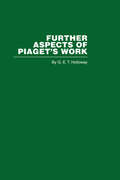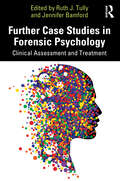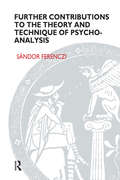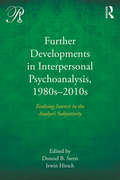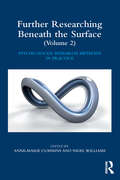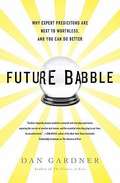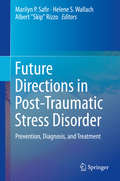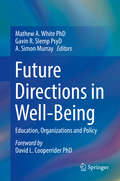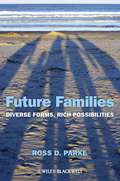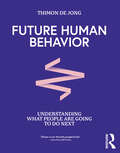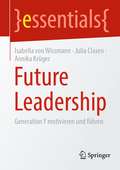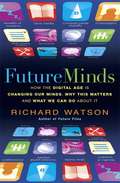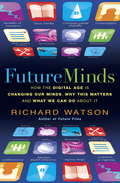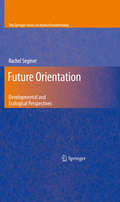- Table View
- List View
Fundiert entscheiden: Ein kleines Handbuch für alle Lebenslagen
by Karsten WeiheOrientierungshilfe in postfaktischen Zeiten Dieses Buch ist ein Rettungsanker in der Flut der Informationen, die ununterbrochen auf uns einstr#65533;men. Tag f#65533;r Tag m#65533;ssen Sie sich Meinungen bilden, sei es zu politischen Fragen, zu privaten Kauf- und Anlageentscheidungen oder zu medizinischen Problemen. Aber wo immer Sie suchen, wen immer Sie fragen - jede Information kann falsch sein! Es scheint kaum m#65533;glich, "die Wahrheit" zu finden und fundierte Entscheidungen zu treffen. Gerade bei den ganz gro#65533;en Fragen geben viele Leute fr#65533;hzeitig auf und vertrauen nur noch ihrem Bauchgef#65533;hl oder dem ersten zuf#65533;lligen Augenschein oder aber dem Experten mit dem seri#65533;sesten Auftritt. Karsten Weihe zeigt Ihnen, dass das nicht sein muss. Die Grundprinzipien, um Informationen einzuordnen und fundierte Entscheidungen zu treffen, sind #65533;berall dieselben. Jeder kann sie durchschauen und in seinem t#65533;glichen Leben anwenden. Mehr als einhundert #65533;berraschende Fallbeispiele veranschaulichen die praxisnahen Erkenntnisse und Handreichungen. Nach der Lekt#65533;re dieses Buches wird Ihnen niemand mehr so leicht etwas vormachen k#65533;nnen!
Funds of Identity: Social, Cognitive and Computational Perspectives)
by Moisès Esteban-GuitartDrawing on research conducted mostly in Catalonia (Spain), Moisès Esteban-Guitart outlines a distinct vision of education enhanced by students' identities, which leads to a discussion of the sociocultural factors that shape the processes of learning. He brings these ideas to life by examining traits of a mobile-centric society, the present-day ecology of learning, and his three metaphors of learning (connecting knowledge, connecting minds, and connecting communities). He then suggests a number of basic principles regarding learning for the twenty-first century based on prior literature in the learning sciences. He presents the terms 'funds of identity' and 'meaningful learning experiences', and reviews the funds of knowledge approach and the Vygotskian basis for understanding identity. In the second part of the book, he illustrates a number of strategies for detecting students' funds of identity and their meaningful learning experiences, and describes some practical experiences based on the theoretical framework he adopted. Revises theoretical principles for education in the twenty-first century. Develops and illustrates how to use students' identity pedagogically. Addresses the situated and distributed nature of learning.
Funds of Knowledge and Identity Pedagogies for Social Justice: International Perspectives and Praxis from Communities, Classrooms, and Curriculum (Routledge Research in Decolonizing Education)
by Moises Esteban-GuitartThis edited volume takes the US-derived concept and praxis of funds of knowledge and applies it globally to critically analyse current education in line with social justice, antiracism, and culturally sustaining pedagogies. Edited by one of the premier international voices for the funds of knowledge approach, and in particular funds of identity theory, chapters foreground first-hand, participatory, research-practice experiences with learners, schools, and local communities. These experiences demonstrate the positive, social-justice inspired pedagogical actions that result in, and reveal, powerful possibilities for a decolonialised, antiracist praxis that aims to eradicate deficit thinking in education. Further, the inclusion of voices that are typically "othered" in the construction and distribution of academic knowledge make this a seminal volume in the field. Ultimately, the volume will be of interest to scholars, students, and researchers working in the sociology of education, psychology of education, and those specifically dealing with antiracism, decolonialism, and equity within education.
Funeral Girl
by Emma K. OhlandSixteen-year-old Georgia Richter feels conflicted about the funeral home her parents run—especially because she has the ability to summon ghosts. With one touch of any body that passes through Richter Funeral Home, she can awaken the spirit of the departed. With one more touch, she makes the spirit disappear, to a fate that remains mysterious to Georgia. To cope with her deep anxiety about death, she does her best to fulfill the final wishes of the deceased whose ghosts she briefly revives. Then her classmate Milo's body arrives at Richter—and his spirit wants help with unfinished business, forcing Georgia to reckon with her relationship to grief and mortality.
Funktionelle MRT: Grundlagen, Experimentaldesign und Datenanalyse
by Stefan Pollmann Tömme NoesseltDie Funktionelle Magnetresonanztomographie (fMRT) hat sich als bahnbrechendes Instrument in den humanen Neurowissenschaften etabliert und wird in verschiedenen Disziplinen wie Medizin, Psychologie und Biologie sowohl für grundlagenwissenschaftliche als auch klinische Untersuchungen eingesetzt. "Einführung in die Funktionelle Magnetresonanztomographie" bietet eine verständliche Einführung in die Grundlagen der fMRT sowie eine ausführliche Erklärung der Designprinzipien von fMRT-Experimenten und der komplexen Schritte der Datenanalyse, einschließlich moderner multivariater Analyseverfahren.Dieses Buch ist sowohl für Einführungskurse auf Masterniveau als auch zum Selbststudium bei der Durchführung von fMRT-Projekten geeignet. Es führt den Leser durch alle notwendigen Schritte, angefangen von der Entwicklung eines Experiments bis hin zur Analyse und Präsentation der Daten sowie ihrer Interpretation. Dabei bringen die Autoren nicht nur ihre eigene Expertise als Mitentwickler der fMRT-Methodik ein, sondern veranschaulichen auch anhand eigener Untersuchungen die praktische Anwendung.Egal, ob Sie Einsteiger oder bereits erfahrener Forscher sind, dieses Buch wird Ihnen dabei helfen, Bildgebungsstudien besser zu verstehen und die fMRT zielgerichtet für Ihre neurowissenschaftliche Forschung zu nutzen.
Funktionelle Magen-Darm-Störungen im Kindes- und Jugendalter: Ein Praxismanual
by Margarete Bolten Corinne LégeretDas Praxismanual bietet sowohl Kinder- und Jugendärzten als auch Kinder- und Jugendpsychiatern und –Psychotherapeuten einen praxisnahen Leitfaden zur interdisziplinären Behandlung von funktionellen Magendarmstörungen im Kindes- und Jugendalter. Dabei werden mit ganzheitlichem Blick und mit Unterstützung von Fallbeispielen sowohl pädiatrische als auch psychosoziale und kinderpsychiatrische Aspekte angesprochen und entsprechende Praxisempfehlungen abgegeben. Besonders hilfreich im klinischen Alltag ist die Materialsammlung zur verhaltensbasierten Behandlung der funktionellen Magendarm-Störungen im Kindes- und Jugendalter. Angesprochen sind Kinder- und Jugendärzte, Kindergastroenterologen, Kinder- und Jugendpsychiater und ärztliche Psychotherapeuten für Kinder- und Jugendliche sowie Psychologische Psychotherapeuten für Kinder- und Jugendliche. Mit Zugang zum eBook und allen Materialien.
Funktionelle Störungen der Nahrungsaufnahme bei Kindern und Jugendlichen: Interdisziplinärer Praxisleitfaden
by Margarete Bolten Corinne Légeret Simone OdenheimerDas Buch behandelt Beeinträchtigungen bei der Nahrungsaufnahme im Kindes- und Jugendalter, die nicht allein durch organische Ursachen erklärt werden können: frühkindliche Fütter- und Essstörungen, Sondendependenz, funktionelles Erbrechen, Ruminationsstörungen und funktionelle Dysphagien. Im Sinne einer ganzheitlichen Betrachtung stellt dieser Leitfaden die Entstehungsbedingungen und das interdisziplinäre Vorgehen bei der Diagnostik und Behandlung funktioneller Störungen der Nahrungsaufnahme bei Kindern und Jugendlichen dar. Das Buch richtet sich an Fachpersonen aus der Kinder- und Jugendmedizin, aus der Psychotherapie, Logopädie, Ergotherapie und Physiotherapie.
Funktionelle neurologische Störungen: Erkennen, verstehen, behandeln
by Stoyan PopkirovDieses Buch bietet eine Übersicht über ein vernachlässigtes Gebiet der Neurologie: Funktionelle Störungen bedingen jeden sechsten Praxisbesuch und etwa 10% der Notfälle und stationären Aufnahmen an neurologischen Kliniken. Dennoch sorgen sie oft für diagnostische Verunsicherung und therapeutische Ratlosigkeit.Praxisnah und evidenzbasiert erläutert der Autor Untersuchungstechniken und klinische Zeichen, die eine frühe und sichere Diagnosestellung jenseits des Ausschlussprinzips möglich machen. Neue Erklärungsmodelle, die Neurophysiologie und Psychosomatik zusammenbringen, verdeutlichen die Entstehungsmechanismen funktioneller Symptome und die Wirkungsweise verschiedener Therapien. Tipps zur ärztlichen Gesprächsführung sowie konkrete Behandlungsempfehlungen aus der Physiotherapie und Psychotherapie sollen die interdisziplinäre Patientenversorgung erleichtern.
Funktionelle neurologische Störungen: Erkennen, verstehen, behandeln
by Stoyan PopkirovDas Gebiet der funktionellen Störungen hat in der Neurologie inzwischen einen festen Platz eingenommen. Um Behandelnden Sicherheit bei der Diagnostik und handfeste Unterstützung bei der Therapie zu bieten, erläutert dieses Buch praxisnah und evidenzbasiert Untersuchungstechniken und klinische Zeichen, die eine frühe und sichere Diagnosestellung jenseits des Ausschlussprinzips möglich machen. Der Autor erklärt die Wirkungsweise verschiedener Therapien und gibt Tipps zur ärztlichen Gesprächsführung sowie konkrete Behandlungsempfehlungen aus der Physiotherapie und Psychotherapie, um die interdisziplinäre Patientenversorgung zu erleichtern. Die überarbeitete Auflage berücksichtigt aktuelle Entwicklungen aus der klinischen Forschung mit einem Akzent auf praktisch relevanten Aspekten. Neue Kapitel behandeln das pragmatische Management funktioneller neurologischer Störungen in der Notaufnahme und Besonderheiten bei Kindern und Jugendlichen.
Funny Peculiar: Gershon Legman and the Psychopathology of Humor
by Mikita BrottmanWhy are jokes funny? Why do we laugh? In Funny Peculiar, Mikita Brottman demurs from recent scholarship that takes laughter-- and the broader domain of humor and the comical--as a liberating social force and an endearing aspect of self-expression. For Brottman, there is nothing funny about laughter, which is less connected to mirth and feelings of good will than to a nexus of darker emotions: fear, aggression, shame, anxiety. Brottman rethinks not only the mechanisms of humor but also the relation of humor to the body and the senses. To this end, she provides an engrossing account of the life and work of Gershon Legman, exiled author, publisher, and sexologist, Alfred Kinsey's first bibliographer, and legendary compiler of the dirty joke. Like Freud, Legman was convinced of the impossibility of understanding humor apart from sex, and Brottman shows how his two massive works on the subject, Rationale of the Dirty Joke and No Laughing Matter, provide a framework for understanding the ambivalent and often hostile impulses that underlie the comic impulse in its various guises. In lively and enlivening chapters, she traverses dirty jokes, the figure of the "evil clown" in popular culture, the current popularity of "humor therapy," changing fashions in stand-up comedy, and the connection between humor and horror. Brottman's sparkling prose, laced with wit, does not obscure the seriousness of Funny Peculiar. It is a thoughtful and wide-ranging elaboration of the Freudian claim that joking, in point of fact, is no laughing matter.
Funology 2: From Usability to Enjoyment (Human–Computer Interaction Series)
by Mark Blythe Andrew MonkHow should we understand and design for fun as a User Experience? This new edition of a classic book is for students, designers and researchers who want to deepen their understanding of fun in the context of HCI. The 2003 edition was the first book to do this and has been influential in broadening the field. It is the most downloaded book in the Springer HCI Series. This edition adds 14 new chapters that go well beyond the topics considered in 2003. New chapter topics include: online dating, interactive rides, wellbeing, somaesthetics, design fiction, critical design and participatory design methods. The first edition chapters are also reprinted, with new notes by their authors setting the context in which the 2003 chapter was written and explaining the developments since then. Taken with the new chapters this adds up to a total of 35 theoretical and practical chapters written by the most influential thinkers from academia and industry in this field.
Further Case Studies in Forensic Psychology: Clinical Assessment and Treatment
by Jennifer Bamford Ruth J. TullyThis unique book offers valuable insights into the often-hidden world of forensic psychological assessment and intervention. It follows on from Case Studies in Forensic Psychology (2019) and presents a range of detailed clinical case studies of adults and young people across secure and community settings. The case studies represent individuals with several different forms of offending histories, such as sexual and violent offending, and various clinical diagnoses including autism and acquired brain injury. Each chapter details the individual’s personal background, offending, any relevant psychiatric or psychological diagnoses, and treatments. The chapters end with an intensive discussion on the outcomes for that case, and its wider implications. This book allows the readers to understand the on-ground clinical practice and day-to-day role of a forensic psychologist by demonstrating the work undertaken behind the empirical research and highlighting the complexities to which psychologists need to apply their expertise. It also brings together treatment models and forensic research to establish how theory translates into practice and consider whether it is effective at an individual level. Further Case Studies in Forensic Psychology is key reading for psychologists, clinicians and practitioners at any stage of their career in this rapidly expanding field. It will also be useful for students of forensic psychology and those interested in the real-life work of psychologists in forensic practice.
Further Contributions to the Theory and Technique of Psycho-analysis (Brunner-mazel Classics In Psychoanalysis Ser. #No. 7)
by Sandor FerencziCharts the development of Ferenczi's 'Active Technique' in papers such as "The Technique of Psychoanalysis" and "Further Development of an Active Therapy". Ferenczi made outstanding contributions to the theory and practice of psychoanalysis. This volume, first published in 1926, brings together the fruit of ten year's work and study. Primary medical in orientation and concerned with technique, it covers a wide range of topics: Nosology, Technique, Sexual Theory, From the Nursery, Dreams, Symbolism, Applied Psycho-Analysis, Medical Jurisprudence and Religion.
Further Developments in Interpersonal Psychoanalysis, 1980s-2010s: Evolving Interest in the Analyst’s Subjectivity (Psychoanalysis in a New Key Book Series)
by Donnel B. Stern Irwin HirschFurther Developments in Interpersonal Psychoanalysis, 1980s-2010s is the second collection of selected classic articles of the modern era by psychoanalysts identified with the interpersonal perspective. The first, The Interpersonal Perspective in Psychoanalysis, 1960s-1990s presented articles by second and third generation interpersonalists. This book contains those written by the third and fourth generation of interpersonal psychoanalysts. The articles selected by the Editors for this second book extend the theme of transference and countertransference that was the throughline of the first book, lending even greater significance in clinical practice to the analyst’s subjectivity and its relation to the patient’s mind. One chapter after another in this book reveal ways that the analyst’s experience can lead to a greater appreciation of the patient’s unconscious experience. It is because of papers such as these that interpersonal psychoanalysis has been described as the origin, at least in North America, of the contemporary clinical interest in psychoanalytic subjectivity. As in the first, the articles in this second book include classic contributions from Bromberg, Greenberg, Hirsch, Mitchell, Levenson, Stern, and Wolstein; these writers are joined here by Blechner, Bonovitz, Buechler, Fiscalini, Held-Weiss, Kuriloff, and White. North American psychoanalysis has long been deeply influenced and substantially changed by clinical and theoretical perspectives first introduced by interpersonal psychoanalysis. Yet even today, despite its origin in the 1930s, many otherwise well-read psychoanalysts and psychotherapists are not well informed about the field. Along with its companion work, this book provides a superb starting point for those who are not as familiar with interpersonal psychoanalysis as they might be. For those who already know the literature, the book will be useful in placing a selection of classic interpersonal articles and their writers in key historical context.
Further Researching Beneath the Surface: Psycho-Social Research Methods in Practice - Volume 2
by Nigel Williams Anne-Marie CumminsContributions in this volume cover ways of knowing, the dynamics of research encounters, new methods of psycho-social inquiry, and the first-hand experience of being a researcher. Since the first volume of Researching Beneath the Surface was published by Karnac in 2009, psycho-social research has become more established but is also more scrutinised by a new generation of researchers, practitioners, and clinicians. This volume offers a timely exploration of the latest developments in psycho-social research, bringing together a series of papers in which both longstanding contributors to the field and new researchers explore tensions, possibilities, and innovations in psycho-socially inspired research.Showcasing advances in psycho-social research methods, the book focuses on methodological dilemmas, innovations in method and methodology, and on experiences of conducting psycho-social research in challenging contexts. It also focusses on the contested but pivotal role of psychoanalysis in psycho-social research and explores what can be added by transdisciplinary use of deep ecology, continental philosophy, and relational approaches as alternative or supplementary ways of knowing.Further Researching Beneath the Surface: Psycho-social Research Methods in Practice offers fresh insight into the practical and emotional issues of conducting oneself as a psycho-social researcher and learning from experience. It will be of great interest to psycho-social, qualitative, organisational, and psychoanalytically-oriented researchers, as well as postgraduate students in these fields.
Future Babble
by Dan GardnerIn 2008, as the price of oil surged above $140 a barrel, experts said it would soon hit $200; a few months later it plunged to $30. In 1967, they said the USSR would be the world’s fastest-growing economy by 2000, the USSR no longer existed. In 1908, it was pronounced that there would be no more wars in Europe; we all know how that turned out. Face it, experts are about as accurate as dart-throwing monkeys. And yet every day we ask them to predict the future—everything from the weather to the likelihood of a terrorist attack. Future Babble is the first book to examine this phenomenon, showing why our brains yearn for certainty about the future, why we are attracted to those who predict it confidently, and why it’s so easy for us to ignore the trail of outrageously wrong forecasts. In this fast-paced, example-packed, sometimes darkly hilarious book, Dan Gardner shows how seminal research by professor Philip Tetlock proved that the more famous a pundit is, the more likely they are to be right about as often as a stopped watch. Gardner also draws on current research in cognitive psychology, political science, and behavioral economics to discover something quite reassuring: The future is always uncertain, but the end is not always near.
Future Directions in Post-Traumatic Stress Disorder
by Marilyn P. Safir Helene S. Wallach Albert Skip" RizzoOurs is an era of increasing tension, both global and local. And not surprisingly, PTSD is recognized not only in combat veterans and active military personnel, but also disaster and assault survivors across the demographic spectrum. As current events from mass shootings to the debate over trigger warnings keep the issue in the public eye, the disorder remains a steady concern among researchers and practitioners. Future Directions in Post-Traumatic Stress Disorder presents findings and ideas with the potential to influence both our conceptualization of the condition and the techniques used to address it. A multidisciplinary panel of experts offers new analyses of risk and resilience factors, individual and group approaches to prevention, the evolving process of diagnosis, and effective treatment and delivery. Chapters on treatment allow readers to compare widely-used prolonged exposure and VR methods with innovative applications of cognitive processing therapy and interpersonal therapy. And an especially compelling contribution surveys empirically-based programs relating to what for many is the emblematic trauma of our time, the events of September 11, 2001. Included in the coverage: Predictors of vulnerability to PTSD: neurobiological and genetic risk factors. Early intervention: is prevention better than cure? The functional neuroanatomy of PTSD. The development of evidence-based treatment for PTSD. Enhancing exposure therapy using D-Cycloserine (DCS). PLUS: a case example as seen through five therapeutic perspectives. While millions experience trauma, relatively few develop chronic PTSD. Future Directions in Post-Traumatic Stress Disorder is a practical and proactive reference for the health and clinical psychologists, sociologists, psychiatrists, and primary care physicians dedicated to further decreasing those numbers.
Future Directions in Well-Being
by A. Simon Murray Mathew A White Gavin R. SlempThis book is a collection of essays advancing the discourse in well-being science, authored by key thought leaders in positive psychology and its variants, including positive education, character education, and positive organizational scholarship. The authors address topics such as the next big ideas in well-being research and practice, potential strategies , as well as current gaps and limitations of the field. This book will be of particular interest for policy makers, educators and practitioners, as well as researchers.
Future Families: Diverse Forms, Rich Possibilities
by Ross D. ParkeFuture Families explores the variety of family forms which characterize our contemporary culture, while addressing the implications of these increasingly diverse family units on child development. Reveals the diversity of new family forms based on the most current research on fathers, same-gender parents, new reproductive technologies, and immigrant families Illustrates that children and adults can thrive in a variety of non-traditional family forms Shows the interrelatedness of new trends in family organization through the common themes of embedded families and caregiving in community and cultural contexts Features an interdisciplinary approach, drawing from works in areas that include child development, family studies, sociology, cross-cultural scholarship, ethnic studies, biology, neuroscience, anthropology and even architecture Sets an agenda for future research in the area of families by identifying important gaps in our knowledge about families and parenting
Future Human Behavior: Understanding What People Are Going To Do Next
by Thimon De JongThe world continues to develop at an astonishing speed – socially and technologically. Human behavior is continually influenced by this ever-changing environment. Is it possible to predict what those new behaviors will be? And what are their implications for our future societies? Thimon de Jong’s Future Human Behavior is a unique and accessible examination of our thrilling, challenging and unpredictable world and how we respond, react and shape it. Using insightful and original examples aligned with pertinent analysis, the author takes the reader on a compelling journey through future behavioral dynamics. He engages with a wide variety of topics, from digitalisation to trust, from ethics to mental health. Future Human Behavior is your inspirational guide to a number of possible futures, and the book you need to be ready for them all.
Future Leadership: Generation Y motivieren und führen (essentials)
by Julia Clasen Isabella von Wissmann Annika KrügerWie wollen Mitglieder der Generation Y geführt werden? Auf Basis wissenschaftlicher Erkenntnisse liefert dieses essential Führungskräften, Beratern und Coaches praktische Handlungsempfehlungen und effektive Methoden für die erfolgreiche Führung von Nachwuchskräften. Anhand von aktuellen Studien werden Bedürfnisse und Erwartungen der Ypsiloner an Führung identifiziert und Erfolgsfaktoren zur Führung dieser Generation abgeleitet. Im Überblick werden drei zentrale Methoden agiler Führung vorgestellt: Scrum, Design Thinking und OKR. Resümierend können Ansätze des agilen Managements zur effektiven Führung von Mitarbeitern der Generation Y als erfolgversprechend bewertet werden.
Future Minds: How the Digital Age Is Changing Our Minds, Why This Matters, and What We Can Do About It
by Richard WatsonWe are on the cusp of a revolution. Mobile phones, computers and iPods are commonplace in hundreds of millions of households worldwide, influencing how we think and shaping how we interact. In the future, smart machines will compete with clever people for employment and even human affection. We are shifting to a world where knowledge will be automated and people will be rewarded instead as conceptual and creative thinkers. Hence being able to think and act in ways that machines cannot will become vital. Ideas are the currency of this new economy and curiosity and imagination are among the key raw materials. But what happens to the rigour of our thinking in a world where we never really sit still or completely switch off? What are some of the unexpected consequences of digital information on the 100 billion cells and quadrillion connections inside our brains? Future Minds illustrates how to maximise the potential of digital technology and minimise its greatest downside, addressing the future of thinking and how we can ensure that we unleash the extraordinary potential of the human mind. In this absorbing new book, discover all about: the sex life of ideas; the rise of the screenager; generations, gender and geography; delving deep inside your head; how to clear a blocked brain; why clever people make dumb mistakes; why we are so afraid of doing nothing; what we can do to reclaim our brains.
Future Minds: How the Digital Age Is Changing Our Minds, Why This Matters, and What We Can Do About It
by Richard WatsonDrawing on the latest research, this book looks at the ways that screen culture is shaping the future and changing the way we think. Future Minds asks: are we becoming addicted to data and how do we go about starting a digital diet, urgently? You'll find thought-provoking and practical suggestions about reclaiming the space and time to think deeply.
Future Orientation
by Rachel SeginerWhere am I going? What do I want to do with my life? Such questions are typical of--even essential to--adolescence and continue to influence individuals throughout their lifetimes. And although human beings are capable of anticipating future events even as infants, the teen years are the peak period for weighing options and setting long-range goals. Future Orientation: Development and Ecological Perspectives synthesizes a wealth of theory and empirical data to explore future thinking as both a developmental process and an individual one. Starting with its origins in childhood, the book identifies the forces that affect this evolution, from early interactions with parents to personality traits and self-processes. Adolescents' future orientation is analyzed by its influences--a complex network of gender expectations, family and peer relationships, and cultural variables--and is, in turn, linked to developmental outcomes at school, capacity for intimacy, and adjustment in emerging adulthood and in adult life. This unique volume: Examines future orientation as an aspect of positive psychology, focusing on the stages of preadolescence, adolescence, and emerging adulthood. Relates future orientation with other psychological constructs relevant to this age group, including identity and self-esteem. Offers ecological and developmental perspectives to explore the effects of family members and peer groups on future thinking. Compares adolescent future thinking across cultures and discusses the roles of gender and gender constructs in future orientation. Complements developmental and educational psychology as well as counseling and parental guidance courses. Given the current climate of rapid social change, Future Orientation is an invaluable reading for researchers, clinicians, and practitioners, including child and school psychologists, psychiatrists, counselors, social workers, and others who work with young people during this critical juncture.
